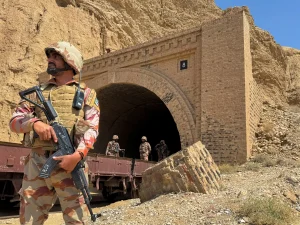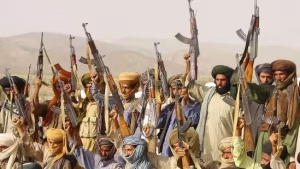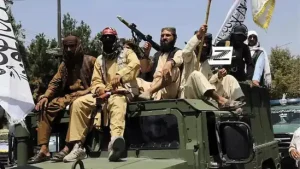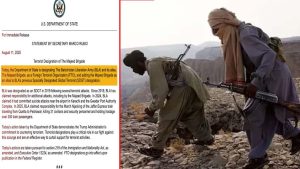Washington D.C. – The United States State Department officially designated the Balochistan Liberation Army as a Foreign Terrorist Organisation (FTO) on Monday, marking a significant escalation in international counter-terrorism efforts. This designation represents a crucial upgrade from the previous Specially Designated Global Terrorist (SDGT) status that the Balochistan Liberation Army received in 2019.
Secretary of State Marco Rubio announced that the Balochistan Liberation Army and its operational alias, The Majeed Brigade, would face enhanced restrictions under the new Foreign Terrorist Organisation classification. The designation demonstrates the Trump Administration’s renewed commitment to combating international terrorism through comprehensive legal frameworks.
Majeed Brigade Alias Added to Designation

The State Department simultaneously added The Majeed Brigade as an official alias to the Balochistan Liberation Army’s existing terrorist designation. This operational branch of the Balochistan Liberation Army has been responsible for numerous high-profile attacks across Pakistan, necessitating specific recognition within the broader organizational structure.
The inclusion of The Majeed Brigade ensures that all financial, logistical, and operational support networks associated with the Balochistan Liberation Army fall under comprehensive sanctions and legal restrictions. This dual designation approach prevents the organization from evading consequences through operational rebranding or structural reorganization.
Escalating Attack Pattern Since 2019


Since receiving its initial SDGT designation in 2019, the Balochistan Liberation Army has significantly expanded its terrorist activities across Pakistan. Secretary Rubio emphasized that the Balochistan Liberation Army has claimed responsibility for numerous additional attacks through its various operational wings, particularly The Majeed Brigade.
The organization’s attack frequency and sophistication have increased substantially, prompting international security agencies to reassess the threat level posed by the Balochistan Liberation Army. This escalation pattern directly contributed to the decision to upgrade the group’s designation status to Foreign Terrorist Organisation.
Deadly 2024 Airport and Port Attacks
The Balochistan Liberation Army orchestrated devastating suicide attacks near Karachi airport and the strategically important Gwadar Port Authority Complex during 2024. These coordinated strikes targeted critical infrastructure nodes, demonstrating the organization’s capability to conduct complex operations against high-value targets.
The Gwadar Port attack particularly concerned international observers due to the facility’s significance in China-Pakistan Economic Corridor projects. The Balochistan Liberation Army’s ability to penetrate security around such strategically vital infrastructure highlighted the group’s growing operational sophistication and regional destabilization potential.
March 2025 Train Hijacking Tragedy
The most devastating recent attack attributed to the Balochistan Liberation Army occurred in March 2025, when militants hijacked the Peshawar-bound Jaffar Express train departing from Quetta. This unprecedented operation resulted in 31 civilian and security personnel deaths while holding more than 300 passengers hostage.
Also Read: Asim Munir US Visit: Explosive Anti-India Nuclear Threats Spark Outrage
The train hijacking represented a significant escalation in the Balochistan Liberation Army’s tactical approach, moving beyond traditional bombing campaigns to sustained hostage operations. This attack directly influenced the State Department’s decision to elevate the group’s terrorist designation to Foreign Terrorist Organisation status.
Legal Framework and Implementation
The Foreign Terrorist Organisation designation operates under section 219 of the Immigration and Nationality Act and Executive Order 13224, both as amended. These legal instruments provide comprehensive tools for disrupting terrorist financing, travel, and operational capabilities of the Balochistan Liberation Army.
The designation becomes effective immediately upon publication in the Federal Register, ensuring rapid implementation of enhanced counter-terrorism measures. This legal framework significantly expands law enforcement capabilities for tracking and prosecuting individuals or organizations providing support to the Balochistan Liberation Army.
Historical Context and Insurgency Background

The Balochistan Liberation Army has conducted a decades-long insurgency against the Pakistani government, seeking independence for the natural resource-rich Balochistan province. Both the United States and Pakistan have previously recognized the organization as a terrorist entity due to its systematic use of violence against civilian and military targets.
The militant group consistently accuses the Pakistani government of exploiting Balochistan’s extensive oil and mineral wealth while the ethnic Baloch minority faces discrimination and poverty. These grievances have fueled recruitment and operational expansion for the Balochistan Liberation Army across the region.
Broader Counter-Terrorism Strategy


The designation reflects the Trump Administration’s comprehensive approach to international terrorism, as emphasized by Secretary Rubio’s statement highlighting America’s commitment to countering terrorist threats. Terrorist designations serve as crucial tools in limiting organizational support and disrupting operational capabilities.
This action follows the recent designation of The Resistance Front, a Lashkar-e-Taiba proxy organization responsible for the April 22 Pahalgam terror attack in India. Secretary Rubio described TRF as a front organization for the UN-designated terrorist group based in Pakistan, demonstrating consistent application of counter-terrorism designations.
International Implications and Regional Security


The Foreign Terrorist Organisation designation significantly impacts regional security dynamics, particularly regarding China-Pakistan Economic Corridor projects and broader South Asian stability. The Balochistan Liberation Army’s targeting of strategic infrastructure poses ongoing threats to international investment and regional development initiatives.
The designation also enhances international cooperation mechanisms for intelligence sharing and operational coordination against the Balochistan Liberation Army. This multilateral approach strengthens regional security frameworks while providing enhanced tools for preventing future attacks and disrupting operational networks.

